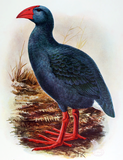Wikipedia:Main Page history/2022 December 20b
From today's featured article
The Réunion swamphen (Porphyrio caerulescens) is a hypothetical extinct species of rail that was endemic to the Mascarene island of Réunion. While only known from accounts by visitors from the 17th and 18th centuries, it was scientifically named in 1848 based on a 1674 account by Sieur Dubois. The Réunion swamphen was described as entirely blue in plumage with a red beak and legs; the size of a Réunion ibis, which could mean 65 to 70 cm (26 to 28 in) in length; and possibly similar to the takahē. While easily hunted, it was a fast runner and able to fly. It may have fed on plant matter and invertebrates, and was said to nest among grasses and aquatic ferns. It was only found on the Plaine des Cafres plateau, to which it may have retreated during the latter part of its existence, whereas other swamphens inhabit lowland swamps. While the last unequivocal account is from 1730, the bird may have survived until 1763. Overhunting and the introduction of cats probably drove it to extinction. (Full article...)
Did you know ...
- ... that the Maria Advocata (pictured) is one of the oldest icons of Mary, mother of Jesus, and that according to legend it was painted by Luke the Evangelist?
- ... that Delaware politician Armwell Long was said to have once outranked his close friend, George Washington?
- ... that revenge buying after the lifting of a 2020 COVID-19 lockdown helped a Hermès store set a record for the most shopping at a luxury outlet in China in a single day?
- ... that cellist Harvey Shapiro played at the 50th anniversary of his professional debut despite broken ribs and a torn muscle incurred from a fall a few days prior?
- ... that at the conclusion of the AFL Women's season seven Grand Final, winning captain Daisy Pearce placed her premiership medal on a young girl?
- ... that the film Death in Small Doses is a dramatization of the real-life death of Nancy Lyon by arsenic poisoning?
- ... that the impeachment proceedings against West Kalimantan Governor Aspar Aswin were shelved after an ethnic riot broke out?
- ... that the mite Neotrombicula fujigmo gets its name from the American military acronym for "Fuck you, Jack, I got my orders"?
In the news
- HTMS Sukhothai (pictured), a corvette of the Royal Thai Navy, capsizes and sinks, leaving 31 crew members missing.
- In the Fijian general election, FijiFirst wins the most seats, but fails to gain a parliamentary majority.
- In association football, the FIFA World Cup concludes with Argentina defeating France in the final.
- At least 24 people are killed in a landslide near Batang Kali, Malaysia.
On this day
- 1955 – Cardiff (city hall pictured) was recognised as the capital of Wales by the British government.
- 1987 – The deadliest peacetime maritime disaster in history occurred when the MV Doña Paz sank after colliding with an oil tanker in the Tablas Strait in the Philippines, resulting in an estimated 4,385 deaths.
- 1988 – The United Nations Convention Against Illicit Traffic in Narcotic Drugs and Psychotropic Substances, governing international cooperation against the illegal drug trade, opened for signatures.
- 1995 – American Airlines Flight 965 crashed into a mountain in Buga, Colombia, killing most of those on board.
- 2007 – Pablo Picasso's Portrait of Suzanne Bloch was stolen from the São Paulo Museum of Art before being recovered about three weeks later.
- John Bell (d. 1820)
- Kan'ichi Asakawa (b. 1873)
- Beatrice Beeby (d. 1991)
Today's featured picture
|
Nanook of the North is a 1922 American silent film written and directed by Robert J. Flaherty, which depicts the life of an Inuit family. From 1910, Flaherty worked for Sir William Mackenzie searching for mineral deposits along the Hudson Bay for the Canadian Northern Railway, and in 1913 he decided to start filming the lands and people of the area, using a glass-plate still camera and movie camera. He then spent 1914 and 1915 shooting hours of film of Inuit life, but his work was lost in 1916 when he dropped a cigarette onto the original camera negative. After four years of raising money, including from French fur company Revillon Frères, Flaherty returned to filming in 1920–21. As a main character, Flaherty chose the hunter Allakariallak. The film was produced in full collaboration with the Inuit. In 1989, Nanook of the North was among the first group of twenty-five films selected by the Library of Congress for preservation in the United States National Film Registry. Film credit: Robert J. Flaherty
Recently featured:
|
Other areas of Wikipedia
- Community portal – The central hub for editors, with resources, links, tasks, and announcements.
- Village pump – Forum for discussions about Wikipedia itself, including policies and technical issues.
- Site news – Sources of news about Wikipedia and the broader Wikimedia movement.
- Teahouse – Ask basic questions about using or editing Wikipedia.
- Help desk – Ask questions about using or editing Wikipedia.
- Reference desk – Ask research questions about encyclopedic topics.
- Content portals – A unique way to navigate the encyclopedia.
Wikipedia's sister projects
Wikipedia is written by volunteer editors and hosted by the Wikimedia Foundation, a non-profit organization that also hosts a range of other volunteer projects:
-
Commons
Free media repository -
MediaWiki
Wiki software development -
Meta-Wiki
Wikimedia project coordination -
Wikibooks
Free textbooks and manuals -
Wikidata
Free knowledge base -
Wikinews
Free-content news -
Wikiquote
Collection of quotations -
Wikisource
Free-content library -
Wikispecies
Directory of species -
Wikiversity
Free learning tools -
Wikivoyage
Free travel guide -
Wiktionary
Dictionary and thesaurus
Wikipedia languages
This Wikipedia is written in English. Many other Wikipedias are available; some of the largest are listed below.
-
1,000,000+ articles
-
250,000+ articles
-
50,000+ articles




